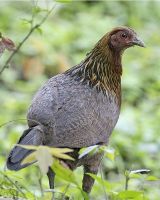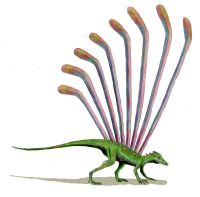 A new YOM post asks “which came first, the chicken or the egg?”
A new YOM post asks “which came first, the chicken or the egg?”
This age-old question really has a simple answer. However, attempts to answer it and to get around implications of the simple answer are often quite convoluted.
Yes, there is an answer: the egg was first, because there have been animals laying eggs for longer than there have been chickens. It’s simple, at least so long as you don’t specify that it must be a chicken egg. But for reasons that have been rather poorly thought out, the ICR insists the opposite was the case:
According to the Creator of chickens, and the author of the record of their origins, chickens came first. It was on the fifth day of creation week that He created “every winged fowl after [their] kind” (Genesis 1:21) complete with the DNA to reproduce that kind. Then, He “blessed them, saying, Be fruitful, and multiply” (v. 22) using that DNA. For the chickens, this meant laying chicken eggs. Problem solved.
Can you see the problem here? Chickens are domesticated, being descended primarily from the Red Junglefowl. In other words, God did not make chickens: humans did. Even the young Earth creationists should properly conclude that chickens were not created on the fifth day.
With this mistake in mind the post becomes a lesson in creationist ignorance. The “chicken came first” claim is based entirely on a failure to check some basic facts before publication, yet it is presented as the word of “the Creator of chickens” – supposedly God – “and the author of the record of their origins.” To make matters worse, this isn’t actually a newly written article. Instead it’s an edited down version of a John Morris FAQ article dating from around 2005, meaning that there have been at least two opportunities to catch the error (and in the era of easy resources like Wikipedia at that). Instead, it has apparently been reused as if it were gospel truth.
The post goes on:
Evolutionists have a different story to tell, however. To them, chickens evolved from other kinds of birds, although which ones remains unclear. It wasn’t flightless birds which gave rise to chickens, because they are thought to have descended from birds which could fly but lost that ability through mutation. Actually, the origin of all types of birds which live today are shrouded in mystery, leading bird expert, Alan Feduccia, to proclaim, “The origin of birds is still up in the air.”
 Alan Feduccia, who we have encountered many times before, holds a contrary (and one might say absurd) view of bird evolution to the mainstream. He believes that birds evolved not from theropod dinosaurs but from a different reptile, the evidence for which really comes down to a single fossil species which may or may not actually have feathers (they could be some other kind of scale, or the animal could even just have been fossilised on top of a fern). This view has become more and more untenable with the discovery of many feathered dinosaurs such as Microraptor, along with the discovery that others like Velociraptor also had feathers. His solution has been to claim that these animals are also birds (and not dinosaurs) which had lost the ability to fly, but this too no longer works unless you wish to claim that even Tyrannosaurids like Yutyrannus (and presumably also T. rex) aren’t dinosaurs. As you might expect the defiant Feduccia is increasingly being seen as on the fringe by everyone except the creationists, who view him as a “leading bird expert.”
Alan Feduccia, who we have encountered many times before, holds a contrary (and one might say absurd) view of bird evolution to the mainstream. He believes that birds evolved not from theropod dinosaurs but from a different reptile, the evidence for which really comes down to a single fossil species which may or may not actually have feathers (they could be some other kind of scale, or the animal could even just have been fossilised on top of a fern). This view has become more and more untenable with the discovery of many feathered dinosaurs such as Microraptor, along with the discovery that others like Velociraptor also had feathers. His solution has been to claim that these animals are also birds (and not dinosaurs) which had lost the ability to fly, but this too no longer works unless you wish to claim that even Tyrannosaurids like Yutyrannus (and presumably also T. rex) aren’t dinosaurs. As you might expect the defiant Feduccia is increasingly being seen as on the fringe by everyone except the creationists, who view him as a “leading bird expert.”
It’s fashionable today to claim that birds evolved from dinosaurs, although again, there is little agreement on which dinosaur lineage was ancestral to birds.
This depends how specific you wish to be: it has been obvious from the start that theropods are a good candidate for bird-anscestors, but if you want to get down to the nitty-gritty you can always find at least some disagreement.
The claim persists in spite of the fact that birds and dinosaurs differ markedly. Legs must become wings and scales must become feathers. Dinosaurs had solid bones, yet bird bones are hollow. Reptilian dinosaurs were likely cold blooded; birds are warm blooded with an extremely high metabolism. Dinosaurs had lungs similar to mammals, while the bird’s breathing scheme is totally different.
While some of these claimed differences may be true when comparing birds with sauropods, or another dinosaur group, many theropods appear to have had feathers (as I said above), hollow bones, warm blood (to the extent that they fit into this dichotomy), and even bird-like lungs.
At least dinosaur eggs were similar to birds’ eggs internally. Externally, they had a soft, leathery shell quite different from bird’s eggs.
I can’t find anything about the “leathery” aspect, but in more easily studied aspects like shape there does seem to be continuity between theropods and bird.
YOM concludes by asking:
What danger is there in saying the egg came first?
The only ‘danger’ I can see from saying that the egg came first is that to do so you must expose yourself to knowledge which, as we know from the story of the Tree of Knowledge, is a dangerous and sinful thing.

Note that Colleen Farmer (Science, 2011 I believe) has demonstrated unidirectional flow in alligator lungs, — thus showing that something rather like the bird lung is primitive for all archosaurs. Also note that crocodiles have somewhat calcareous eggs, and so did dinosaurs (not quite as derived as the cleidoic egg of birds, but, hey, it’s a start).
A number of modern, non-extinct, birds have keratin scales on their feet.
This post made me laugh out loud! It’s informative, too – I’m no expert on dinosaurs – so thank you for it. Oops, how sinful.
The chicken’s egg is implied in the original question, of course. So if one were to ask ‘Which came first the animal or the egg’ would the answers be similar? Also, I believe it is the Tree of the Knowledge of Good and Evil not just general knowledge, but I’m sure you knew that and were just making the assessment that creationists are quite against the acquiring of it i.e. science. Personally, I think its all just interpretive opinions and no better until the invention of time machines and then many historians will wind up egg-faced. Hah!
If it’s a chicken egg then there is no simple answer, and arguably no answer at all.
It still has to be the egg; one laid by a bird that was almost a true chicken but not quite.